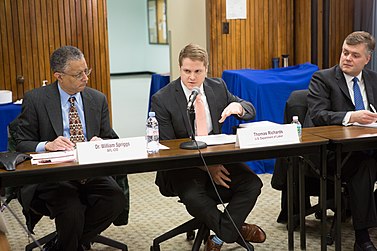Martha Jean "The Queen" Steinberg (b. September 9, 1930, Memphis, Tennessee – d. January 29, 2000, Detroit, Michigan) was an influential African American radio broadcaster and later was also the pastor of her own church.
She was born Martha Jean Jones in Memphis, Tennessee. Her first radio job was on Memphis's WDIA starting in 1954. There, she was one of the first female disc jockeys in the United States, with a program that included the latest R&B hits along with the typical "household hints" programming that was de rigueur at the time for female radio personalities.
In 1963, Steinberg moved to Detroit, Michigan, where she was heard on WCHB and then throughout the late 1960s and 1970s on WJLB. On July 23, 1967, Steinberg convinced WJLB to cancel its normal evening programming and she did an on-air program calling for people to calm down and stop rioting. It has been suggested that this prevented the 1967 Detroit Riot from being worse than it was.
During her time at WJLB, Steinberg also led the station's on-air staff in protest of the fact that the station, at the time, had no African American employees outside of the air staff.
Steinberg had a cameo role as a television show host in the 1973 film Detroit 9000.
In 1980, WJLB converted from AM to the FM dial, and Steinberg's show was dropped in the process. The former WJLB-AM became WMZK with an ethnic format. In 1982, Steinberg purchased WMZK-AM and changed the call letters to WQBH in order to offer more gospel music-oriented programming. Steinberg remained on the air at WQBH (1400 on the AM dial) until her death.
Martha Jean Steinberg died on January 29, 2000, in Detroit, Michigan.
In 2017, she was inducted into Rhythm & Blues Hall of Fame.
88888888888888888888888888888888888888888888888888888888888888888888888888888888888888888888888888888888888888888888888888888888888888888888888888888888888888888888888888
Inscription-
"The Queen"
Born in Memphis Tennessee
Daughters- Diane Steinberg Lewis, Sandra, Trienere
Grandchildren- Sierra Kiani Lewis, Kendra LeAna Jean Lewis, Kayla, Luther.
A distinguished radio pioneer of WDIA Memphi, Tenn. & WJLB Detroit, MI. First African American female to own a radio station. The Queen's broadcasting Corp. 1400 A.M Detroit, Michigan. Founded the Blue Collar Workers of America acknowledging the common man welho earned his bread by the sweat of his brow, saying you are somebody and you are responsible for the wheels of this world turning around. Founded by the Queen's community workers to work for the betterment of her fellow mantouched by the Holy Spirit on Feb. 12, 1972. She then entered the order of the fisherman ministry. Located at the home of love which she founded. Instrumental in quelling Detroit's 1967 Rebellion with a message of peace, love & common sense conducted an annual prayer service on Dec. 31 for the postive progression for her beloved city Lady Detroit. Voted Michigander of the year 1996. Founding partner for the MGM- Grand Casino.
Long Live "The Queen"
God Bless You- I Love You
I Bet'cha∼Born in Memphis, Tennessee to Virgil Jones and Florence (Mobley) Jones, Radio Pioneer and legend, Martha Jean "The Queen" Steinberg was the 4th of 5 children. Initially known as the voice to 'Quell the Rebellion of '67' during the riots, she became beloved radio personality and first African American Woman to own her own stand alone radio station WQBH Radio 1400 am. Her spiritual guidance and no nonsense advice led her to found The Order of the Fisherman Ministry in Detroit, Mi. Her younger brother, Carl Eugene Jones, was the first black Quarter back for UCLA in the 60's. Her eldest daughter, recording artist, Dianne Steinberg, appeared in the 1978 RSO movie, "Sgt Pepper's Lonely Hearts Club Band" as "Lucy in the Sky With Diamonds". She had two other daughters: Sandra Kay and Trienere E. Steinberg. 4 grandchildren: Sierra Kiani Lewis and Kendra Leana-Jean Lewis of California and Kayla Fox Steinberg and Luther Fox Steinberg II of Detroit.
Inscription
Radio Station WJLB Commentator
88888888888888888888888888888888888888888888888888888888888888888888888888888888888888888888888888888888888888888888888888888888888888888888888888888888
Martha Jean Steinberg - Wikipedia
Martha Jean “The Queen” Jones Steinberg (1930-2000) - Find a Grave Memorial





